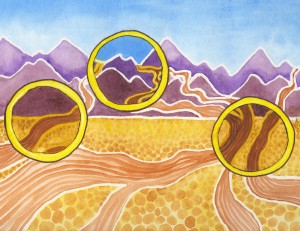There are a lot of different ways to have an academic career. Your academic career is affected by both your own values and desires, and by forces beyond your control. Although a lot of academic career advice suggests that there is a clear path to success, there are lots of reasons you may not end up on that path. You have choices.
Your academic job probably doesn’t live up to expectations
Your academic career is not a railway track
You get into an academic career because you care a lot about a particular topic and want to learn more about it. You value the autonomy that an academic career promises. You value learning, and scholarship, and research.
Despite the state of the academic labour market, you are now working as an academic. The job turns out to be a lot more complex and varied than you thought. Your autonomy is constrained in ways you may not have expected, or feels like it’s just the freedom to work ridiculously long hours. Or maybe both.
You still like this job. You think it’s important. And there are days when you wonder whether it’s worth it.
Your academic job probably doesn’t live up to expectations.
This is normal. Being an academic in the 21st century is pretty complicated. There isn’t just one kind of academic career.
- Institutional missions and organizational cultures matter.
- National and regional policies matter.
- Your own values matter.
The work itself is usually described as some combination of teaching, research, and administration (or service, depending where you are). The proportions of each will vary considerably. What each of those things looks like also varies. The specific character of teaching, research, and administration/service in your country and institution set the larger context. Your own values also form part of this broader context and will intersect with those external structures and cultures in particular ways creating myriad possible trajectories that an academic career might take.
While the term “career” is used to refer to one’s job or profession, especially one held for a long time and with possibilities of progression, it derives from the Latin carrus, wheeled vehicle. It is first used in English in the mid-sixteenth century and denotes a road or racecourse. The word “career” points more to the path your progression through a job or profession takes than to the job itself.
Your academic career is not like a railway track.

Some of the dominant narratives of the academic career seem to characterise the path of the academic career as if it were a railway. The railway metaphor can be comforting. In a strange city, I find taking the train much less stressful than other forms of transport because I only know the train will stop at my desired destination, and I only need to know the names of a few intervening stops to confirm I’m on the right track.
However comforting, the railway metaphor is not a very accurate representation of an academic career. It suggests that the path is much more rigid than it actually is, with limited options for switching to a different track. While we could make the metaphor richer with reference to main lines and branch lines, railways always offer a far more limited set of options for getting around than other forms of transportation. The railway metaphor also tends to bring to mind derailment as a metaphor for getting off the track, which makes certain events seem much more disastrous than they really are.
I still like this sense of a track or path, though. Your academic career is a long journey. You are hoping it’s going to last 30 years or more. Chances are you are going to travel by a lot of different routes along the way. You might catch a train for a specific part of the journey but you have a lot more options than that metaphor offers.
How to find your way.
Wayfinding is about being able to read the signs no matter where you are. You have a sense of where you are going at least in general terms. You will periodically pause on your journey and look up to see if you are still headed in that direction. Most travellers have maps, guidebooks, and railway & bus timetables. You’ve probably got tips from people who’ve been this way before and ideas from fellow travellers of things you might like to see and options you might want to consider. You also have your own sense of direction and can learn to read the signs. Start by looking around you and really seeing where you are.
You may be standing somewhere like a crossroads. There are clear, well-paved, roads leading away from your current position. There may be clear signposts indicating where those roads lead and where they pass through on the way there. One of the roads may be wider and in better condition and promise that you will reach the final destination more quickly than the other. All your options may be equally good roads but pass through different places on the way. Or, your other options may be well signposted but take a longer route or pass through an area you hadn’t planned to visit. You consult your map and guidebook and off you go.
Sometimes, where you are doesn’t look like that at all. You aren’t sure where it is on the map. You may be looking at paths rather than roads. Some of them may not be well travelled at all and are starting to get overgrown. The signposts may not be clear or may be missing. Perhaps one of the destination signs has broken off. The whole journey is unlikely to be this way. Chances are that if you travel on a more difficult path for a while, you will eventually come to another crossroads. Things will look different from there.
It is also possible that things were going just fine and then a big tree fell across the road or the bridge was washed out. You will be justifiably upset, especially if you hacked through foliage to get to that good road in the first place. Take a deep breath. You might have to double back and take a turn you’d decided against. You might need to break your own trail. All is not lost.
You have options.

They may not be the options you’d like. They may not be the same options other people have.
You’ll notice that my metaphorical examples did not focus on how skilled a traveller you are. I did not invoke magic to get you from where you are, to where you want to be. I did not assume you were at the railway station with a ticket in your hand and the express train to a full professorship at a prestigious university was boarding. Nor did I assume that’s even the train you want to get on.
You are where you are. You got here by making the best decisions you could, given the options available to you as you went along. Your options will always be constrained in various ways. Sometimes things look pretty disastrous. Sometimes the options you have are ones you wish you never needed to consider or were actively trying to avoid.
You have a vision for where you want to go and what you hope to find there. You may have to take a more circuitous route than you planned. The things you learn on your journey may prompt you to revise your vision of the destination. You may discover that the things you really wanted aren’t where you thought they were.
I do not advise that you avoid all the well made roads with clear signposts. There isn’t necessarily anything wrong with those destinations. The paths other people have taken to reach them are good ways to get there. However, if they won’t let you in or the road you want to take is blocked, all is not lost.
It is also a good idea to make sure that the destination is one you want to reach. Your reasons for going there may be different from other people’s reasons. You may prefer a destination other people are trying to avoid. You may find that you aren’t prepared to take certain routes to get there, even if that means changing your destination. It is also a good idea to stop and reflect periodically because sometimes new possibilities open up and your priorities change.
If your intuition is telling you that a well travelled path is not the right path for you, perhaps by making it difficult for you to focus on the tasks required to travel down it, trust your intuition and look at your options. If the route you’d like to take is blocked, look for an alternate route. If you think you’ve hit a dead end, take a look around for overgrown paths, secret doors, and magic jump boots and remember you can probably go back the way you came and find another crossroads.
There are multiple ways to have an academic career. There are multiple careers that will use your knowledge and skills.
Find your way to your destination.
Help with finding your way.
Sometimes it’s helpful to have a Guide to help you with this. I offer regular support, as a Guide for the Journey to help you make your way along the path.
Or, you can book a free consult with me to chat over what kind of support might suit you best.
Related posts:
The importance of your vision talks more about how to orient yourself (text and audio)
What’s your ideal academic job? includes some questions to help you identify important elements
The Spectre of Professionalism: Field, discipline, interdisciplinary (one of the ways your freedom may be constrained in unexpected ways)
Jumping off cliffs (because sometimes it seems like there isn’t a path at all)
Struggling to make progress towards a goal? (working out if you really want this goal)








